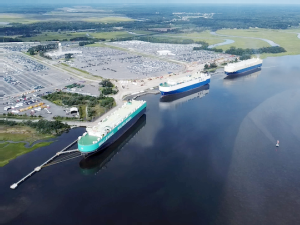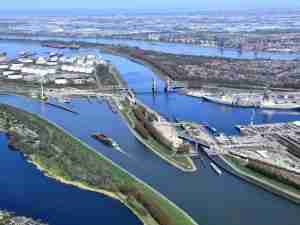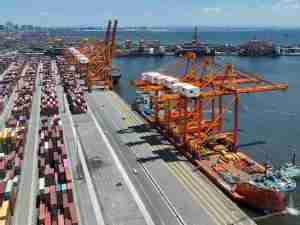The Virginia Port Authority (VPA) says that it has succeeded in reducing truck emissions in the port by 17% thanks to its green truck program initiated in 2009.
Heather Wood, director of environmental affairs for the VPA told the AJOT that the program has focused on the retrofit and replacement of harbor trucks bringing containers to and from the Virginia port. This has resulted in the retrofit of 150 trucks and the replacement of 65 trucks. VPA is using an incentive program that pays $15,000 toward the replacement of older trucks that pollute and are less fuel efficient. VPA provides $6,000 for retrofits.
The success reflects a stronger emphasis on sustainability and reduced emissions which were the focus of panels at the Virginia Maritime Association (VMA) International Trade Symposium that took place in Norfolk, Virginia on May 5th.
The VMA event is annually produced by Homer “Butch” Crane, assistant vice present for K Line America. Inc. Under Crane’s influence carriers, shippers and port employees have worked to promote the annual VMA event making it an important venue on the Atlantic coast maritime calendar.
Port Pollution Challenges
James Jack, executive director of the Coalition for Responsible Transportation, which represents shippers and truckers, said that tougher anti-pollution standards imposed at the port of Los Angeles and Long Beach have set a standard that other ports must now follow. He said the clean truck program in California is now being successfully replicated by VPA and other ports around the United States.
Jack said that it was important for maritime industry interests to address the problem before tougher regulatory requirements were imposed by Washington.
Dr Elena Craft, health scientist with the Environmental Defense Fund said that the level of pollution impacting communities surrounding the LA-Long Beach ports necessitated tougher clean air standards that would end the practice of "children filtering port pollution through their lungs."
Retailers Demand Tough Enviromental Practices
Casey Chroust, executive vice-president of retail operations for the Retail Industry Leaders Association (RILA), said that sustainability issues are becoming top priorities for the nation’s retailers. As a result, they are imposing tougher sustainability standards in transportation, warehousing and in the operation of retail outlets. This is helping retailers reduce waste in receiving and shipping truckloads as well as reducing the over-all number of truckloads. Chroust said promoting sustainability and green economic practices is creating a responsible corporate image with the public..
Chroust, the luncheon keynote speaker at the VMA symposium, noted that electronic and mobile phone innovations are making it easier for consumers to shop and order on line. More internet orders by consumers help companies analyze product trends and improve inventory controls. Finally, the expanded use of online shopping is likely to slow the growth of retail outlets, he said.
Retailers are also imposing stricter audits of sustainability practices and product safety practices. These audits are migrating toward suppliers and supply chain practices of logistics partners.
One interesting trend, he noted, is that retailers are increasing the establishment of stores in urban areas as opposed to suburban areas where long-term growth has slowed.
High gasoline prices are also discouraging shoppers driving long distances suggesting that the suburban growth era may be coming to an end.
Some participants at the symposium privately noted that warehousing may also need to be positioned closer to end users to reduce trucking moves and fuel consumption.
Chroust says RILA is increasingly concerned about the negative impact of traffic congestion on retail sales and supports increased spending on roads bridges and other transportation infrastructure that enhances the flow of goods and reduces transportation costs and delays.










